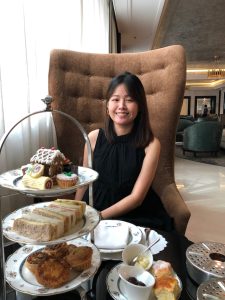Not too long ago, we (the TallyPress Team) worked together in person for the first time ever. (You can read the full story here.) While we were there, we had a lot of conversation and brainstorming for ideas, and we learned that search results for “personality tests” went up over the last two years–I guess people wanted to reflect upon themselves and look inwards. On a whim, I got everyone in the team to take two personality tests to see if the results would be accurate, based on our own understanding of ourselves, as well as how we see each other. To be fair, we don’t know each other that well because we hardly meet, but we did get to know each other slightly better, and this is our story of team-building!
The Personality Tests We Took
“Personality” is basically what makes a person… a person. There are many theories surrounding personality, as there are different measurement tools i.e. personality tests. We took two different personality tests: the Myers-Briggs Type Indicator, and the Enneagram. Before we tell you our personalities, here’s an overview of what they are–we’ll keep it simple.
Myers-Briggs Type Indicator (MBTI)

Creators: Isabel Briggs Myers and her mother Katharine Briggs
First Published: 1962
The MBTI is arguably the most widely used and most popular personality test used today. Though it was only published in 1962, research was ongoing for 20 odd years before that. Based on theories of Carl Jung, the MBTI uses four of these “categories” to determine personality:
- Extraversion vs introversion
- Sensation vs intuition
- Thinking vs feeling
- Judging vs perceiving
Personality results are derived from one letter taken from each category, e.g. ESTJ, INFP etc. (N represents intuition.) There are 16 different personality types according to this test.
Enneagram
:max_bytes(150000):strip_icc()/the-enneagram-of-personality-4691757-v2-efacc55bed9440db9382ee0791c7f70f.png)
Origins: Largely unknown, though it could date back to ancient roots in Babylon or classic Greek philosophy, attributed to the Jewish Kabbalah, Christian mysticism, and Sufism
The Enneagram is a system of personality typing that describes patterns in how people interpret their world and manage their emotions. There are nine personality types simply numbered 1 to 9, and each of the types is defined by a particular core belief about how the world works. Driving one’s deepest motivations and fears, this core belief shapes a person’s worldview and the perspective through which they see the world and people around them.
Getting to Know Ourselves and Each Other
It’s me. I contributed to the increase in search results, having done these personality tests last year. Amongst our team, some of us have heard of/done these tests before, while some were completely new to it. Take it as a “getting to know us” section below as we share our roles in TallyPress, our personality test results, and whether or not we think the results are accurate both for ourselves and each other.
Yiing Zhi
Writer/Editor + I try to make sure everything runs smoothly
INFJ (Introverted, Intuitive, Feeling, Judging)
- Also known as “The Advocate”
- Strengths: Creative, insightful, principled, organised, passionate, altruistic
- Weaknesses: Can be overly sensitive (especially to criticism), perfectionistic, prone to burnout, stubborn, can have overly high expectations (of self and others)
- Rarest personality type among population
- Enjoys thinking about the meaning of life
Enneagram Type 1
- Also known as “The Perfectionist”
- Likes to do things correctly and to high standards, are sticklers for rules
- Always strives to improve things, but afraid of making mistakes
- Key motivations: To be right, to be consistent with their ideals, to be beyond criticism
- Key fears: Being “bad’, morally flawed, or otherwise imperfect

Anyone who even knows me slightly will hurry to agree with all of the above, no questions asked, myself included. Even Jessica who only knew me for all of four months realised it. It’s true, I’m such a rule-follower that my family gets annoyed with me. I remember we were in Tasmania and it was so quiet; there were no cars, no pedestrians, and still I insisted we wait for the traffic light to turn green before we crossed the road. They won because I’m only one person, but it almost escalated into a fight when I started telling them how it “wasn’t right”. I don’t like making mistakes, and I beat myself up hard when I catch myself making them. I’m working on being kinder to myself, but I’m still terrified because why do something if I’m not going to do it right?
Jessica
Conversationist i.e. your friendly admin
ESFJ (Extraverted, “Sensing” [Observant], Feeling, Judging)
- Also known as “The Consul/Caregiver”
- Strengths: Kind, outgoing, organised, practical, dependable, loyal, supportive
- Weaknesses: Can be needy, inflexible, controlling, approval-seeking, too selfless
- Attentive and people-focused, enjoys taking part in social community, could be popular
- Conflict-averse, will aim to restore harmony and stability if there’s tension
Enneagram Type 7
- Also known as “The Enthusiast”
- Has a desire to experience everything life has to offer while avoiding pain and boredom
- Has a wide range of interests and always on the go, possessing relentless curiosity for new information and experiences
- Key motivations: To maintain their freedom and happiness, and keep themselves excited and occupied
- Key fears: Missing out or be deprived of excitement

Jessica’s take on her personality results is 50/50. There are some things she thinks are accurate to a T, like “getting out there” to avoid pain and boredom, though she doesn’t necessarily think of herself as an extrovert. Based on what I do know about her, I think she’s a pretty accurate depiction of an ESFJ. I don’t make friends easily, but Jessica had me warmed up to her on our first meeting, and she has since invited me to and helped me out on certain things. As she’s the only extrovert in our team, I’d say her role suits her, because none of us could stomach talking to people all the time. I’d know. I’ve tried.
Poh Qin
Social media content creator
INFJ (Introverted, Intuitive, Feeling, Judging)
- Also known as “The Advocate”
- Strengths: Creative, insightful, principled, organised, passionate, altruistic
- Weaknesses: Can be overly sensitive (especially to criticism), perfectionistic, prone to burnout, stubborn, can have overly high expectations (of self and others)
- Rarest personality type among population
- Enjoys thinking about the meaning of life
Enneagram Type 6
- Also known as “The Skeptic”
- Seeks to anticipate and avoid risk, as well as support and reassurance from other people
- Alert and vigilant, always thinking several steps ahead to anticipate and prepare for what could go wrong
- Key motivations: Safety and security
- Key fears: Making important decisions, yet resist anyone else making those decisions for them

Full disclosure: Poh Qin and I have been friends since we were 13, and it never crossed my mind that she would be an INFJ like me. She relates more to her Enneagram type though, and says that it’s very accurate. Type sixes are known to be contradictory, and that’s what she thinks she is, somewhat led away by whatever influence is hitting her hardest in any given moment. From what I know about her, she does give a lot of thought to making any decision, and she does have a hard time making “big” ones. She is incredibly supportive of whatever plans I concoct (sometimes they border on fantastical), but she takes very measured steps in her own plans.
JC
Writer
INFP (Introverted, Intuitive, Feeling, Perceiving)
- Also known as “The Idealist/Mediator”
- Strengths: Loyal and devoted, caring, good at seeing the “big picture”, idealistic, open-minded
- Weaknesses: Can be overly idealistic, tends to take everything personally, self-isolating, self-critical, can overlook details
- Spends a lot of time exploring their own purpose in life, and how they fit into the world
- Has a strong interest in making the world a better place
Enneagram Type 9
- Also known as “The Peacemaker”
- Desires to maintain a sense of inner peace and harmony, and avoid conflict or other emotional disturbances
- Typically goes with the flow, but dislikes being controlled, will respond with passive resistance if pushed too far
- Key motivations: Be settled and in harmony with the world
- Key fears: Be lost or separated from others

JC was an INFJ (for the rarest personality type, there’s a lot of people around me who are INFJs) a few years ago, but taking the test this time round yielded that she’s an INFP instead. She believes that work and life experiences have changed her, therefore her personality has changed slightly as well. JC agrees that the test results are largely accurate, especially playing the role of the peacemaker in her family, used to mediating arguments between her siblings. I don’t know JC that well yet, but I find that she’s super zen to be around, and has a calming presence. I think that she is good at seeing the “big picture”, but not necessarily overlooking the finer details.
Casey
Writer
INTJ (Introverted, Intuitive, Thinking, Judging)
- Also known as “The Architect”
- Strengths: Rational, confident, hardworking, independent, versatile
- Weaknesses: Can be overly analytical and judgmental, can seem callous or insensitive or arrogant, dismissive of emotions
- One of the rarest and most capable personality types
- Questions everything, prefers to make their own discoveries
Enneagram Type 5
- Also known as “The Investigator”
- Focuses on being knowledgeable and competent so that they can be as self-sufficient as possible
- Fiercely non-conformist, cares little about trends or accepted ways of progressing through the stages of life
- Key motivations: To be competent and possess a strong understanding of their environment
- Key fears: Overwhelmed by the needs of the self and others

Casey sees himself in certain traits, but also thinks the results could be talking about anyone because they’re statements about people, and people all have different traits. A very rational, logical statement that only serves to reinforce my belief that the results are indeed accurate. Again, I don’t know Casey well, but I think I can safely say among the all of us, he’s the quietest, and the most independent. I don’t know about being non-conformist, but I do think he likes making discoveries.
Working with Each Other
It’s a fairly recent decision to work together as a team, properly, if you can’t tell. I personally think that these tests are great for self-reflection at the very least, and also to get to know each other a little better based on our reactions to and analysis of the results. We’re still getting to know each other, and getting used to the way we work, but so far I think it’s going pretty smoothly. Thanks to these personality test results, we know what we’re good at, and how not to step on each other’s toes to facilitate a pleasant, efficient work flow. Take a personality test, or two, even if it’s just for fun! You might be surprised at what you learn
- The MBTI test: https://www.16personalities.com/free-personality-test
- The Enneagram test: https://www.truity.com/test/enneagram-personality-test

We also suggest that you do it when you have some free time, and are sufficiently relaxed. The question list could be a little lengthy, and doing it while sleepy and/or frustrated may not be the best!
More real stories from real people here:














